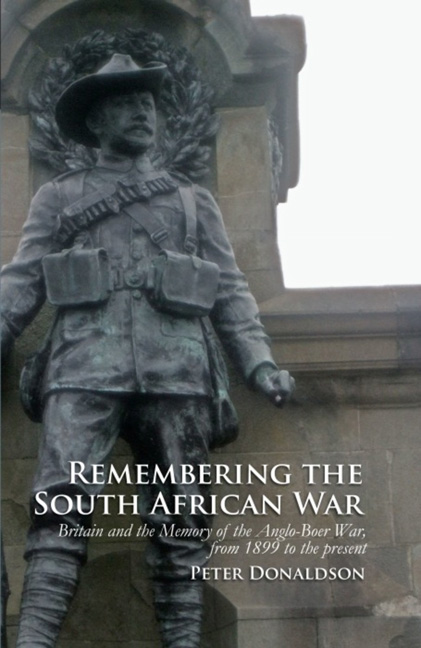 Remembering the South African War
Remembering the South African War Book contents
- Frontmatter
- Dedication
- Contents
- List of Illustrations
- Acknowledgements
- Introduction
- 1 Civic War Memorials: Public Pride and Private Grief
- 2 Pro Patria Mori: Remembering the Regiment
- 3 Vitai Lampada: Remembering the War in Schools
- 4 Alternative Affiliations: Remembering the War in Families, Workplaces and Places of Worship
- 5 Writing the Anglo-Boer War: Leo Amery, Frederick Maurice and the History of the South African War
- 6 Filming the War: Television, Kenneth Griffith and the Boer War
- Conclusion
- Bibliography
- Index
1 - Civic War Memorials: Public Pride and Private Grief
- Frontmatter
- Dedication
- Contents
- List of Illustrations
- Acknowledgements
- Introduction
- 1 Civic War Memorials: Public Pride and Private Grief
- 2 Pro Patria Mori: Remembering the Regiment
- 3 Vitai Lampada: Remembering the War in Schools
- 4 Alternative Affiliations: Remembering the War in Families, Workplaces and Places of Worship
- 5 Writing the Anglo-Boer War: Leo Amery, Frederick Maurice and the History of the South African War
- 6 Filming the War: Television, Kenneth Griffith and the Boer War
- Conclusion
- Bibliography
- Index
Summary
Late Victorian and Edwardian Britain was a society obsessed with social class and stratification, yet the war in South Africa had been a crucial evolutionary moment for the British middle and working classes. Emerging from the shadow of the aristocracy, the middle classes, and lower middle classes in particular, made up the majority of the initial volunteers for the army and thus often perceived themselves to be the instruments of victory. The war validated and confirmed their importance, status and respectability. Working-class volunteers had also come forward in large numbers, although historians debate the extent to which the motivation was patriotic or economic. To many, such an egregious manifestation of patriotic service demanded some form of permanent recognition. Thus, civic leaders throughout the country took it upon themselves to begin the process of memorialising their locality's contribution to the imperial cause. This chapter will explore how civic communities went about the business of constructing memorials in honour of their citizen-soldiers and, in the process, will attempt to shed light on the extent to which such commemorative sites can be said to have embodied a collective memory of the war.
Although it was common for the inscriptions on civic and county memorials to claim collective ownership by declaring that a monument was raised through public subscription, determining the extent to which commemorative projects were genuinely expressions of popular demand is very difficult. Frequently organising committees simply emerged from pre-existing hierarchical patterns, legitimising their membership and role by claiming that they were giving concrete form to the desires felt by their own particular communities. As might be expected, leadership tended to come from those either already in a position of influence or unencumbered by other demands and therefore able to dedicate time and energy to a memorial project. This, in practice, effectively meant those in a comfortable financial position. Indeed, so embedded was the idea of paternalistic public service in late Victorian and early Edwardian society, with Victoria's Golden and Diamond Jubilees and Lansdowne's South African War Fund having provided the most recent opportunities for displays of civic largesse, that the formation of an organising committee rarely involved much in the way of preparatory work.
- Type
- Chapter
- Information
- Remembering the South African WarBritain and the Memory of the Anglo-Boer War, from 1899 to the Present, pp. 11 - 46Publisher: Liverpool University PressPrint publication year: 2013


